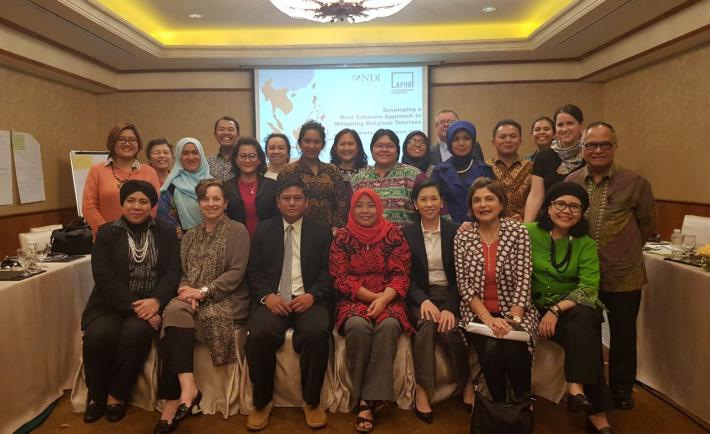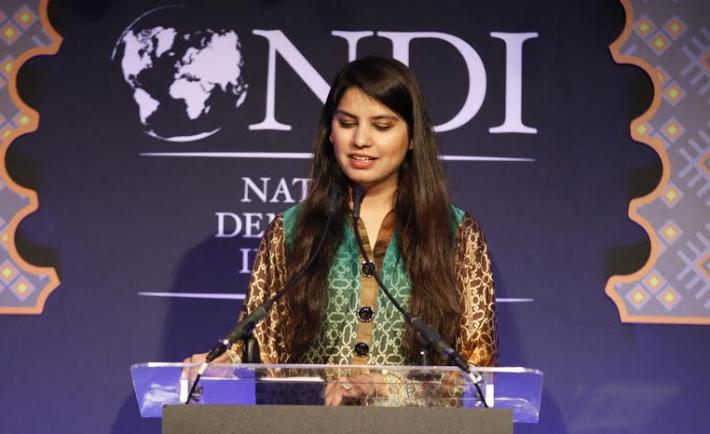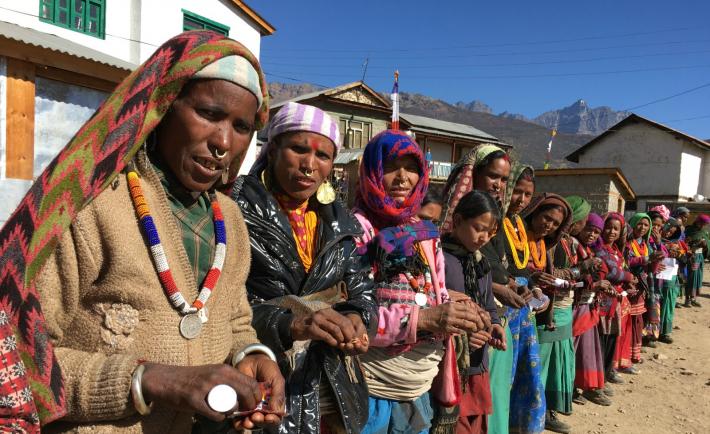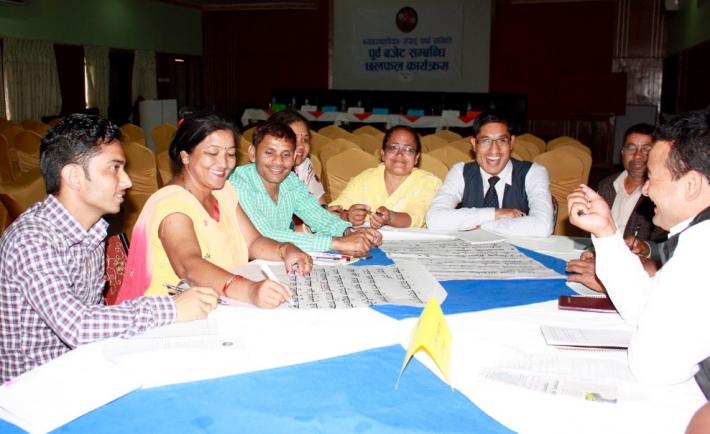NDI and ASEAN Parliamentarians for Human Rights (APHR), a regional human rights advocacy organization, partnered to provide parliamentarians in Southeast Asia with the resources and networks to raise awareness and share best practices on religious freedom issues in the region.
Promoting Religious Freedom in Southeast Asia
Supporting Nepal’s Post-Conflict Transition from the Bottom-Up
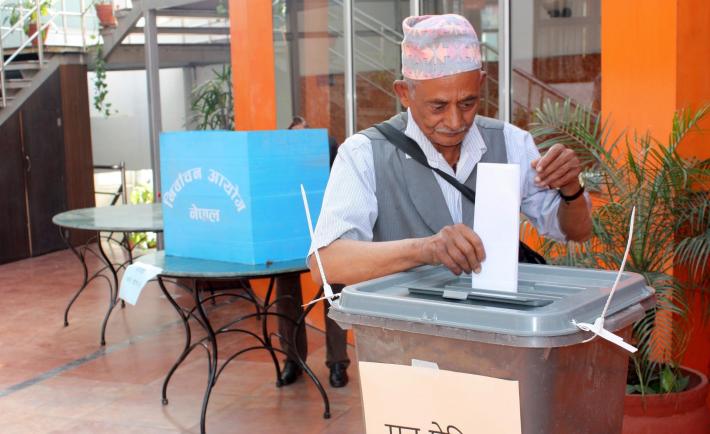
A political party participant casts his vote during a mock election exercise on April 25, 2017 in Nepal. Through mock elections, candidates familiarized themselves with the voting process in order to conduct more effective voter outreach.
Since the end of its brutal decade-long civil war in 2006, Nepal has undergone a rocky, but peaceful democratic transition. The country has transitioned through the dissolution of its monarchy, the restoration of parliament, a devastating earthquake, the adoption of a new constitution, and the establishment of a federal republic. However, persistent poverty, the geographic isolation of many villages, and the marginalization of certain ethnic communities pose severe challenges to the nation’s economic and political development. Since the adoption of a new constitution in September 2015, significant progress has been made to improve government effectiveness, increase social inclusion and cohesion, and increase the responsiveness of the country’s representative institutions such as parliament and its political parties. Through on-the-ground engagement at each step in this time of change, NDI has worked to ensure that Nepali democracy reflects what matters to citizens, most recently in the country’s watershed local elections.
Myanmar MPs Strategize on Consensus and Ethics Reform

How to get to YES: a venn-diagram can be a useful tool to formulate areas of agreement among opposing sides during intense negotiations.
Ending ethnic conflict, opening up the economy, creating jobs and adopting constitutional reform are very large tasks looming in Burma’s future. Building consensus with minority parties also will be critical for the big changes that the Burmese must enact. But it would be a mistake to bet against a country of such beauty and tremendous natural resources, which welcomes you with a warm mingalaba (how are you doing!) greeting in each encounter.
Women’s Political Equality in Pakistan: Not an Impossible Mission
How did I come to understand what has become my mission in life? Well, I come from a social context in Pakistan where, like in all developing countries, women’s vision and committed approach to a practical life goes through tough challenges. It can even start within a woman’s own family. Fortunately, my family stood by my ambition of joining social work as a profession.
Empowering Women in Nepal for a Better Tomorrow
Prior to my work with NDI, the term “democracy” in Nepal seemed to imply a group of leaders fighting for power, without regard to the norms and values of democracy. Democracy was not for the people, of the people and by the people, but for the leaders, of the leaders and by the leaders. This perception commonly held by political parties in my country made me think - did democracy really exist? Will future generations adopt and carry the same values that we practice in our daily lives or will they bring about changes?
Nepal Parliament Finance Committee Enhances Voice and Input of Citizens through Pre-Budget Discussions
For the first time in Nepal’s history, pre-budget discussions took place outside of the nation’s capital city of Kathmandu. Since 2014, Nepal's Legislature Parliament Finance Committee has worked with NDI to increase citizen participation, especially in the area of citizen input in the budget process through public consultations. NDI offered its support to the Finance Committee by organizing Committee-led pre-budget discussions throughout 2015 and 2016 to reach out to citizens in the hill, mountain and Tarai regions. The discussions fostered dialogue between Nepali citizens and the parliament, thus opening the decision-making processes to more people. Consultations equipped the Finance Committee with the information and confidence it needed to make improving the overall budget process a priority prior to the finalization of Nepal's new constitution.
Nepal Civil Society Monitors Earthquake Reconstruction Process
Ordinary citizens and civic organizations become tremendously more active in the community immediately after a tragedy hits their community. This was my experience with my community in Kosovo in the post-war reconstruction in the late 90’s and this has certainly been the case in Nepal after two mega earthquakes last year took close to 9,000 lives, injured more than 22,000 people and destroyed more than 600,000 homes. Nepalis in solidarity with their fellow citizens flocked to help with relief materials, building shelters and reinforcing other people’s homes. The spirit of the community was very high.
What Became of the People Power Revolution? Observations and Impressions of Philippines Elections 1986 and Now
---day-before-elections.png)
Larry Garber meeting with Jose Concepcion Jr, the first chair of NAMFREL on the day before the 2016 Philippines elections
The 1986 Philippines snap presidential election serves as a lodestar for international democratic activists who came of age professionally during the 1980s. The successful People Power Revolution demonstrated the role that electoral participation could play in mobilizing a population to reject a fraudulent process and to overthrow a dictator. And it introduced the international community to such concepts as “domestic election monitoring” and “parallel vote tabulations,” which are now core components of the menu used by democracy promoters around the globe. Indeed, since 1986, Filipino activists have frequently been called upon to share their experiences with those contemplating how best to challenge entrenched authoritarian regimes. I observed these developments in the Philippines first-hand.
Papa said: “Set a benchmark for the women in our community”
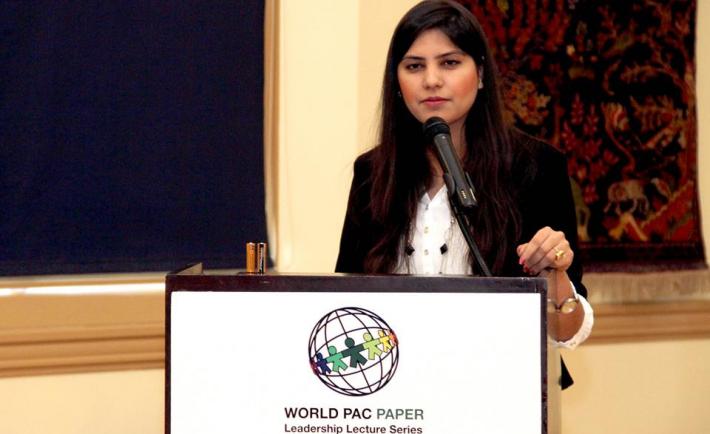
Sehrish Naseem, the 2016 Andi Parhamovich Fellow, at Marietta College Speaking about Young Pakistani Women Leading Transition in Their Society.
One day at breakfast when I was 23 years old I asked my father, “Papa, why is not aunty considering to contest the general elections, even though she is an active member of our community?” A smile appeared on his face and replied, “because if she does our community will stop considering her a woman.” My aunt was not a politician, but as an opinionated and socially active woman with a deep understanding of the issues facing Pakistan, I thought she should be. This was the moment I came to believe that democracy cannot exist without empowered women. And empowerment comes through women’s access to education, health, and employment because it creates space for them to play an active political role.
Venezuela, Burma, Burkina Faso: Connect the Democratic Dots…

A Burmese anti-government protest in front of the Petronas Twin Towers. Photo credit: Off2riorob CC BY
In the four weeks between November 8 and December 6, 2015, the peoples of Myanmar (Burma), Burkina Faso and Venezuela delivered surprises: resounding defeats to military rule, strongman domination and populist authoritarianism. These bright spots are the consequence of perseverance by democratic activists in the face of repression. They also highlight the importance of elections as a peaceful means for people to bring about change.

